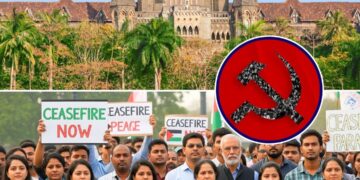The CPI(M) secures court approval to hold a Gaza solidarity protest at Mumbai’s Azad Maidan, marking a legal win for the party’s right to public assembly.

Bombay High Court Grants CPI(M) Permission for Gaza Protest at Azad Maidan
Court Reverses Earlier Denial, Approves Peaceful Assembly on August 20
After a legal tussle spanning several weeks, the Bombay High Court has granted permission to the Communist Party of India (Marxist) to hold a peaceful protest at Azad Maidan in Mumbai. The demonstration is scheduled for August 20, between 3 PM and 6 PM, intended to protest the ongoing genocide in Gaza and call for a ceasefire. The court’s decision came after the Mumbai Police confirmed their approval for the rally.
Petition and Police Denials: The Legal Saga
The conflict began when CPI(M) and affiliated groups, including the All India Peace and Solidarity Organisation (AIPSO), sought permission to hold a peaceful gathering at Azad Maidan—one of the city’s designated protest sites.
Their requests were repeatedly denied by the Mumbai Police on June 19, July 15, and July 31, citing concerns over law-and-order and the international nature of the protest theme.
The party challenged these refusals in the High Court, calling them arbitrary and unjust, especially given that the protest aligned with India’s official stand calling for humanitarian aid and a ceasefire in Gaza.
Earlier Court Rejection and ‘Patriotism’ Remarks
On July 25, the same division bench—Justices Ravindra Ghuge and Gautam Ankhad—dismissed the initial plea, sharply criticizing CPI(M)’s focus on international affairs. The bench remarked that the party should concentrate on pressing local issues instead of what’s happening thousands of miles away.
As the court put it: “Our country has enough issues … look at your own country. Be patriots”. The bench also cautioned against the diplomatic fallout from controversial foreign protests.
Final Outcome and Conditions
In the latest hearing, CPI(M) informed the court that the protest in Pune had already been permitted and held peacefully. The Mumbai Police confirmed in court that they would allow the protest at Azad Maidan with conditions under the Maharashtra Police Act, such as ensuring public order and compliance with regulations for public gatherings. With this, the bench disposed of the petition positively.
Reflections and Significance
This resolution underscores the delicate balance between democratic expression and civic regulation. The court’s earlier rebuke reiterated the expectation that political parties remain focused on domestic priorities, even as they assert constitutional rights.
However, the eventual green light for the protest highlights that freedom of assembly remains fundamental—even when the cause is international in nature. It also shows that legal persistence can yield results, particularly when authorities provide assurance of orderly conduct.
For CPI(M), this marks not just a legal victory but also a reaffirmation of its right to express solidarity on global humanitarian issues. As India continues to grapple with domestic challenges, this episode serves as a potent reminder: advocacy at home and empathy abroad are not mutually exclusive—but must be navigated thoughtfully in public discourse.
READ ALSO….Election Commission Rejects Congress’s ‘Vote Theft’ Allegations as Factually Baseless 2025















 Categories
Categories









